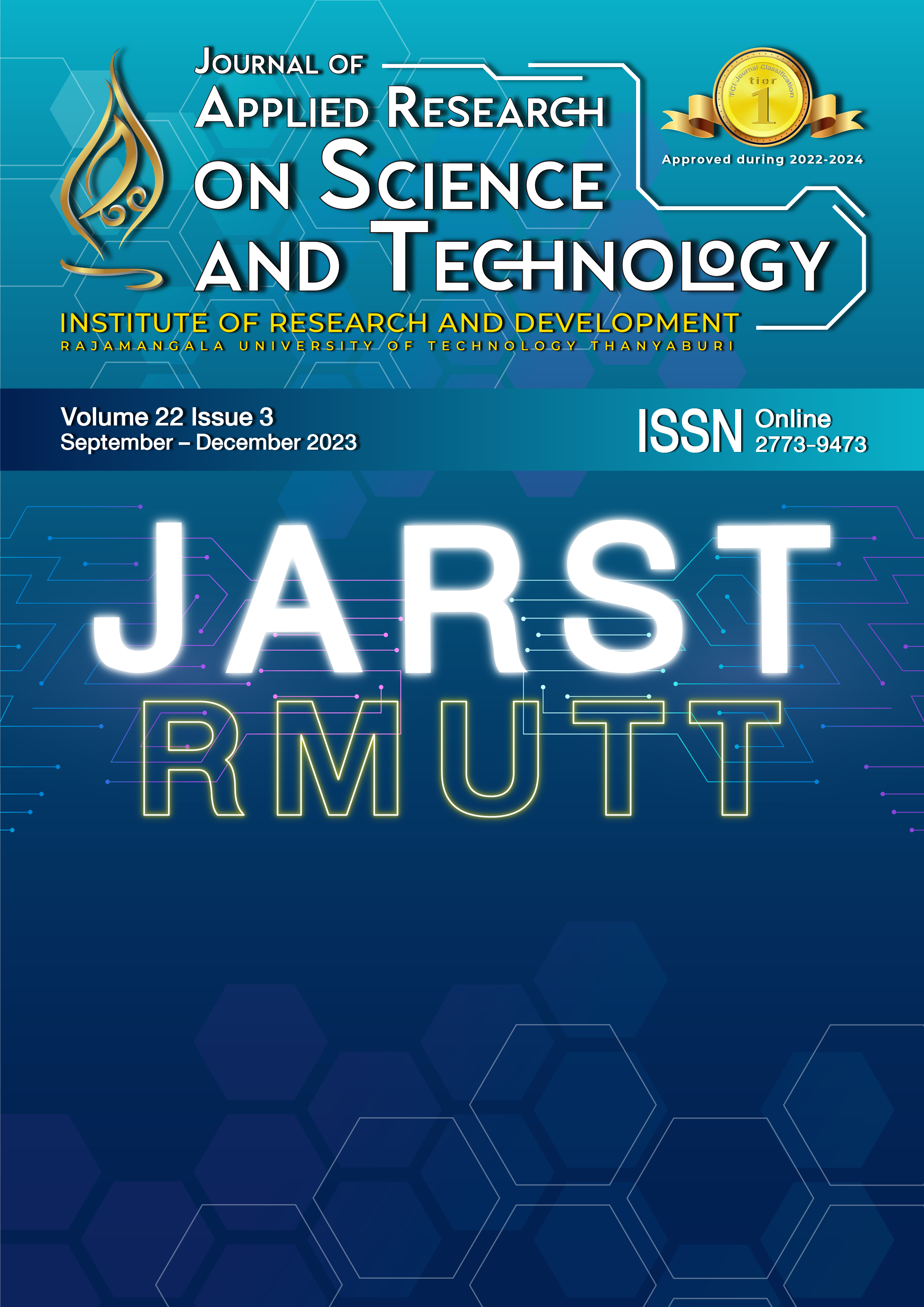Fabrication of PS-TiO2 hybrid via mini-emulsion polymerization: Study the effect of crosslink on the photocatalytic properties of the hybrid
Main Article Content
Abstract
In this study, a polystyrene (PS)/nano-TiO2 hybrid was prepared by a mini-emulsion polymerization process to improve the photocatalytic properties when the crosslinking agent was added. N, N'-methylenebis (acrylamide) (MbA) was used as a crosslinking agent. The effect of a crosslinking agent on the photocatalytic properties was studied. The diameter, morphology, and photocatalytic properties of the samples were characterized and discussed. The methylene blue discoloration was monitored at 660 nm by a spectrophotometer. The result showed that the L* value from the Hunter color scale for 7 wt% TiO2-PS/0.25 wt% MbA was highest at 73.73. It was noticed that the 7 wt% TiO2 - PS/0.25 wt% MbA hybrid gave the highest photocatalytic properties. The FE-SEM confirmed the well-defined structure with a spherical shape and network formation to improve the photocatalytic properties. The diameter and morphology of the PS/TiO2 hybrid were in the range of 76 nm to 95 nm by using a field emission scanning electron microscope (FE-SEM). The particle size of the 1 wt% TiO2 - PS/0.25 wt% MbA was 76 nm, which was smaller than that of the pristine PS of 88 nm. The particle size of the 7 wt% TiO2 – PS/0.25 wt% MbA hybrid was increased by 25%. The HR-TEM image of the PS/TiO2 hybrid was studied to confirm the encapsulation of TiO2 particles in the hybrid. The FFT image of PS/MbA/TiO2 7 wt% demonstrated the crystalline structure of TiO2 (dot) and the amorphous structure of PS (ring). FT-IR spectroscopy confirmed the presence of the Ti-O functional group in the PS hybrid spectra. It was noticed that the TiO2 particles were successfully encapsulated in the PS/TiO2 hybrid.
Article Details

This work is licensed under a Creative Commons Attribution-NonCommercial-NoDerivatives 4.0 International License.
References
Selvin TP, Kuruvilla J, Sabu T. Mechanical properties of titanium dioxide-filled polystyrene microcomposites. Mater Lett. 2004;58(3):281-9.
Sanchez C, Julián B, Belleville P, Popall M. Applications of hybrid organic-inorganic nanocomposites. J Mater Chem. 2005;15(3536):3559-92.
Lebeau B, Sanchez C. Sol-gel derived hybrid inorganic-organic nanocomposites for optics. Curr Opin Solid State Mater Sci. 1999;4(1):11-23.
Kim TW, Yang Y, Li F, Kwan WL. Electrical memory devices based on inorganic/organic nanocomposites. NPG Asia Mater. 2012;4(6):e18-e.
Jordan J, Jacob KI, Tannenbaum R, Sharaf M, Jasiuk I. Experimental trends in polymer nanocomposites - a review. Mater Sci Eng. 2009;393:1-11.
Amin KF, Asrafuzzaman, Nahin AM, Hoque ME. 10 - Polymer nanocomposites for adhesives and coatings. In: Hoque ME, Ramar K, Sharif A, editors. Advanced Polymer Nanocomposites: Woodhead Publishing; 2022. p. 235-65.
Alam MR, Islam T, Repon MR, Hoque ME. 16 - Carbon-based polymer nanocomposites for electronic textiles (e-textiles). In: Hoque ME, Ramar K, Sharif A, editors. Advanced Polymer Nanocomposites: Woodhead Publishing; 2022. p. 443-82.
Wang X, Wang X, Meng A, Li Z, Xing J. Rapid, continuous, large-scale synthesis of ZnO/Ag hybrid nanoparticles via one-step impinging stream route for efficient photocatalytic and anti-algal applications. Mater Today Commun. 2022;30:103121.
Ferreira Soares DC, Domingues SC, Viana DB, Tebaldi ML. Polymer-hybrid nanoparticles: Current advances in biomedical applications. Biomed Pharmacother. 2020;131:110695.
Shetty A, Chandra S. Inorganic hybrid nanoparticles in cancer theranostics: understanding their combinations for better clinical translation. Mater Today Chem. 2020;18:100381.
Fitriani F, Bilad MR, Aprilia S, Arahman N. Biodegradable Hybrid Polymer Film for Packaging: A review. J Nat Fibers. 2023;20(1):2159606.
Lan Y, Lu Y, Ren Z. Mini review on photocatalysis of titanium dioxide nanoparticles and their solar applications. Nano Energy. 2013;2(5):1031-45.
Metanawin S, Metanawin T. Fabrication of hybrid polystyrene-titanium dioxide with enhanced dye degradation and antimicrobial properties: investigation of the effect of triethylene glycol dimethacrylate on photocatalytic activity. Polym Int. 2022;71(7):777-89.
Metanawin S, Sornsuwit N, Metanawin T. Miniemulsion polymerization technique enhancement: The photocatalysis of commercial rutile-TiO2 hybrids with nano poly(methyl methacrylate). Polym-Plast Technol Mater. 2022;61(1):56-68.
Metanawin T, Panutumrong P, Metanawin S. Synthesis of Polyurethane/TiO2 Hybrid with High Encapsulation Efficiency Using One-Step Miniemulsion Polymerization for Methylene Blue Degradation and its Antibacterial Applications. ChemistrySelect. 2023;8(11):e202204522.
Sztorch B, Nowak K, Frydrych M, Leśniewska J, Krysiak K, Przekop RE, et al. Improving the Dispersibility of TiO2 in the Colloidal System Using Trifunctional Spherosilicates. Materials. 2023;16(4):1442.
Akhtar S, Shahzad K, Mushtaq S, Ali I, Rafe MH, Fazal-ul-Karim SM. Antibacterial and antiviral potential of colloidal Titanium dioxide (TiO2) nanoparticles suitable for biological applications. Mater Res Express. 2019;6(10):105409.
Tsang CHA, Li K, Zeng Y, Zhao W, Zhang T, Zhan Y, et al. Titanium oxide based photocatalytic materials development and their role of in the air pollutants degradation: Overview and forecast. Environ Int. 2019;125:200-28.
Fujishima A, Rao TN, Tryk DA. Titanium dioxide photocatalysis. J Photochem Photobiol C. 2000;1(1):1-21.
Reddy KR, Hassan M, Gomes VG. Hybrid nanostructures based on titanium dioxide for enhanced photocatalysis. Appl Catal A: Gen. 2015;489:1-16.
Mironyuk IF, Soltys LM, Tatarchuk TR, Tsinurchyn VI. Ways to Improve the Efficiency of TiO2-based Photocatalysts (Review). Phys Chem Solid State. 2020;21(2):300-11.
Rong Y, Chen HZ, Wu G, Wang M. Preparation and characterization of titanium dioxide nanoparticle/polystyrene composites via radical polymerization. Mater Chem Phys. 2005;91(2):370-4.
Melgoza-Ramírez ML, Ramírez-Bon R. Microstructural comparison between PMMA-SiO2 and PMMA-TiO2 hybrid systems using Eu3+ as ion-probe luminescence. J Non-Cryst Solids. 2020;544:120167.
Erdem B, Sudol ED, Dimonie VL, El-Aasser MS. Encapsulation of inorganic particles via miniemulsion polymerization. Macromol Symp. 2000;155(1):181-98.


